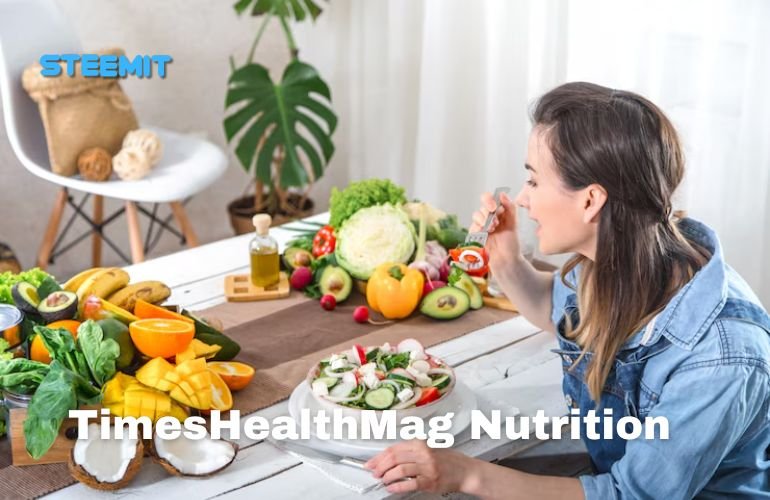Nutrition shapes how we live, and thrive yet modern lifestyles often leave diets crowded with quick fixes and conflicting advice. Timeshealthmag Nutrition has emerged as a trusted voice, merging science-backed guidance with practical solutions for today’s challenges. This article explores how their approach redefines healthy eating, from foundational principles to cutting-edge trends. Discover strategies tailored to your lifestyle, learn to separate fact from fiction, and see how mental well-being ties to what’s on your plate. Whether you’re seeking clarity or inspiration, here’s how Timeshealthmag Nutrition is changing the way we think about food—and why it matters.
Foundational Principles for Optimal Nutrition
Healthy eating starts with simple, science-backed habits. Here’s how to build a diet that works:
1. Choose Whole Foods Consistently
Processed snacks and meals often contain hidden sugars, excess salt, and artificial additives. Whole foods—fresh produce, nuts, legumes, and unrefined grains—provide natural fiber, vitamins, and minerals. These nutrients support digestion, immunity, and steady energy levels.
2. Balance Proteins, Carbs, and Fats
Proteins (like eggs, beans, or fish) repair muscles and organs. Carbohydrates (whole grains, fruits) fuel daily activities. Fats (avocados, olive oil) aid hormone production and nutrient absorption. Skipping any group risks deficiencies; moderation and variety prevent extremes.
3. Drink Enough Water Daily
Dehydration slows metabolism, impairs focus, and strains organs. Aim for six to eight glasses daily, adjusting for exercise or heat. Herbal teas or water infused with citrus or mint offer flavor without added sugars.
4. Focus on How You Eat
Eating quickly or while distracted often leads to overconsumption. Pausing between bites, savoring flavors, and stopping when full fosters better digestion and satisfaction. Structured meal times and minimizing screens during meals reinforce these habits.
These principles form a flexible framework, adaptable to individual needs without strict rules. Small, consistent changes yield lasting results.
Personalized Nutrition: Adapting to Diverse Lifestyles
No single diet fits everyone. Here’s how nutrition adapts to unique needs:

1. For Busy Professionals
Time constraints demand efficiency. Prioritize meal prepping: cook batches of grains, roasted vegetables, and lean proteins for easy assembly. Portable snacks like nuts, Greek yogurt, or fruit prevent reliance on vending machines. Hydration reminders on phones or apps counterbalance coffee-heavy routines.
2. For Fitness Enthusiasts
Active bodies require more protein for muscle repair and carbohydrates for sustained energy. Post-workout meals should combine both, like grilled chicken with sweet potatoes. Electrolyte-rich drinks or sodium-added snacks help replenish minerals lost through sweat.
3. For Aging Adults
Bone health and cognitive function take priority. Calcium-rich foods (leafy greens, fortified plant milks) and omega-3 sources (fatty fish, walnuts) support these goals. Smaller, frequent meals ease digestion, while fiber-rich choices combat sluggish metabolism.
4. Cultural and Dietary Preferences
Respect traditions while making mindful swaps. Replace refined grains in cultural dishes with whole-grain alternatives (brown rice instead of white). Plant-based eaters can focus on legumes and fermented foods for protein and gut health.
5. Budget-Friendly Options
Frozen vegetables and canned beans retain nutrients at lower costs. Buying seasonal produce or bulk whole grains cuts expenses. Planning meals around sales reduces waste.
Tailoring nutrition acknowledges individual challenges without sacrificing health. Practical adjustments, not perfection, create sustainable habits.
Trends, Myths, and Science-Backed Truths
Nutrition evolves constantly, blending new discoveries with persistent misunderstandings. Here’s clarity on what matters:
1. Gut Health and the Microbiome
Research links gut bacteria to immunity, mood, and metabolism. Fermented foods (yogurt, kimchi) and fiber-rich plants (oats, bananas) nourish beneficial microbes. Timeshealthmag highlights studies showing improved digestion and reduced inflammation with probiotic-rich diets.
2. Plant-Based Eating Gains Ground
Diets centered on vegetables, legumes, and nuts lower heart disease risks and environmental footprints. However, balanced plant-based plans require attention to iron, B12, and protein—think lentils, fortified cereals, and tofu.
3. Intermittent Fasting: Hype or Helpful?
Limiting eating windows (e.g., 8–10 hours daily) may aid weight management and blood sugar control for some. Yet, it’s not universal; athletes or those with specific health conditions often need steady fuel.
4. Supplements: Necessity or Excess?
Most nutrients should come from food. Exceptions include vitamin D (limited sun exposure) or B12 (strict vegan diets). Overuse of multivitamins rarely replaces poor eating habits.
5. Common Nutrition Misconceptions and Facts
- “All fats are harmful”: Unsaturated fats (avocados, nuts) protect heart health.
- “Carbs cause weight gain”: Whole grains and fruits support energy; excess refined sugars drive issues.
- “Protein is only for athletes”: Older adults and active individuals alike need adequate intake for muscle preservation.
- “Supplements guarantee health”: They address gaps but can’t replicate whole foods’ complexity.
Timeshealthmag Nutrition separates fleeting trends from research-backed strategies, helping readers make informed choices without falling for quick fixes.
Nutrition and Mental Health: A Symbiotic Relationship
What we eat doesn’t just shape our bodies—it influences mood, focus, and emotional resilience. Emerging science reveals how diet and mental well-being interconnect:
1. Nutrients That Support Brain Function
- Omega-3 fatty acids (found in salmon, chia seeds) aid neurotransmitter activity, linked to reduced anxiety and depression.
- B vitamins (leafy greens, eggs) regulate stress hormones and energy production.
- Antioxidants (berries, dark chocolate) combat oxidative stress, which harms brain cells.
- Magnesium and zinc (pumpkin seeds, legumes) improve sleep quality and neural communication.
2. Blood Sugar Stability and Mood Swings
Skipping meals or overloading on sugary snacks causes energy crashes and irritability. Balanced meals with protein, fiber, and healthy fats (e.g., avocado toast with an egg) maintain steady glucose levels, stabilizing mood.
3. Gut-Brain Axis: How Digestion Affects Emotions
The gut produces serotonin, a neurotransmitter tied to happiness. Diets rich in probiotics (kefir, sauerkraut) and prebiotics (garlic, asparagus) foster gut diversity, potentially easing symptoms of anxiety.
4. Emotional Eating and Food Choices
Stress or boredom often drives cravings for high-sugar, high-fat foods. Acknowledging triggers and keeping nutrient-dense snacks (air-popped popcorn, nuts) accessible helps break cycles of impulsive eating.
5. Timeshealthmag’s Approach to Mental Health Advocacy
The platform emphasizes non-restrictive eating, encouraging readers to view food as fuel rather than a source of guilt. Collaborations with psychologists and dietitians highlight strategies like mindful eating workshops and stress-management meal plans.
Mental health and nutrition form a feedback loop: better eating habits uplift mood, while emotional balance supports healthier choices. Timeshealthmag Nutrition bridges this gap, offering science-backed guidance to nourish both body and mind.
Timeshealthmag Nutrition: Trusted Expertise and Credibility
Timeshealthmag Nutrition stands apart by prioritizing accuracy, transparency, and actionable guidance. Here’s what sets their platform apart:
1. Science-Backed Content
Every article, recipe, and recommendation relies on peer-reviewed studies and clinical trials. Their team cross-references findings with institutions like the World Health Organization and academic journals, avoiding sensationalized claims. Updates reflect the latest research, ensuring readers access current information.
2. Qualified Contributors
Articles are authored or reviewed by registered dietitians, physicians, and researchers. Credentials are openly shared, building trust. For example, a gut health piece might include insights from a gastroenterologist, while a plant-based diet guide features input from a nutritionist specializing in vegan lifestyles.
3. Historical Track Record
Launched in 2010, the platform has evolved alongside nutritional science. Early advocacy for Mediterranean diets and skepticism toward fad cleansers positioned them as a voice of reason. Awards from health organizations and reader testimonials underscore their impact.
4. Tools for Personalized Health
Interactive features like meal planners, hydration trackers, and symptom checkers help users apply advice to their lives. A “Build Your Plate” tool, for instance, visualizes portion sizes based on dietary goals, while a supplement quiz matches needs to evidence-based options.
5. Transparency in Partnerships
Sponsored content or affiliate products are clearly labeled. Collaborations with brands align with their editorial standards—no endorsements for unverified supplements or extreme diet programs.
6. Community-Driven Feedback
Reader questions and experiences shape content. A recent series on budget-friendly meals emerged from audience requests, and myth-busting articles address recurring misconceptions submitted via social media.
By merging rigor with relatability, Timeshealthmag Nutrition earns loyalty in a crowded digital health space. Their commitment to clarity over hype makes them a go-to resource for those seeking sustainable, evidence-based nutrition strategies.
Future Innovations and Community-Driven Wellness
Timeshealthmag Nutrition continues to evolve, blending innovation with collective action to meet changing health needs. Here’s what lies ahead:

1. Smarter Personalization Through Technology
Plans include integrating genetic insights and AI-driven assessments to tailor dietary advice. Imagine apps that analyze blood sugar trends or gut health data, suggesting meal adjustments in real time. Partnerships with wearable tech companies aim to sync fitness trackers with nutrition plans, creating holistic health profiles.
2. Expanding Accessible Digital Tools
New features like virtual cooking classes with dietitians and symptom-tracking databases will debut. Interactive guides on seasonal eating or allergy-friendly swaps will cater to niche needs, while video content breaks down complex topics like metabolic science into digestible lessons.
3. Building Stronger Communities
Online hubs will connect users with shared goals—think forums for parents managing picky eaters or groups exploring cultural diets. Local chapters may host farmers’ market tours or potlucks celebrating diverse cuisines. Crowdsourced recipe contests and peer-led challenges will foster accountability.
4. Global Sustainability Initiatives
The platform will spotlight diets that benefit both people and the planet. Guides on reducing food waste, choosing eco-friendly proteins, and supporting ethical brands will expand. Collaborations with agricultural experts aim to educate readers on regenerative farming and its impact on nutrient density.
5. Research Frontiers
Upcoming articles will explore understudied areas, like nutrition’s role in managing chronic pain or the effects of climate change on food security. Citizen science projects might invite readers to participate in studies tracking dietary patterns and health outcomes.
Timeshealthmag Nutrition’s roadmap reflects a commitment to growth without losing sight of core values: clarity, inclusivity, and evidence-based guidance. By staying responsive to scientific advances and reader input, they aim to remain a trusted ally in lifelong wellness.
Final Thoughts
Nutrition is no longer a one-size-fits-all equation—it’s a dynamic interplay of science, individuality, and evolving needs. Timeshealthmag Nutrition bridges gaps between research and real life, offering tools that adapt to busy schedules, cultural preferences, and health goals. By demystifying trends, prioritizing mental well-being, and grounding advice in evidence, the platform empowers readers to make choices rooted in knowledge, not hype. As technology and community reshape how we approach food, Timeshealthmag remains a steady guide, proving that sustainable health starts with clarity, not complexity. The future of nutrition is here, and it’s built on trust, innovation, and the shared belief that better eating transforms lives.





